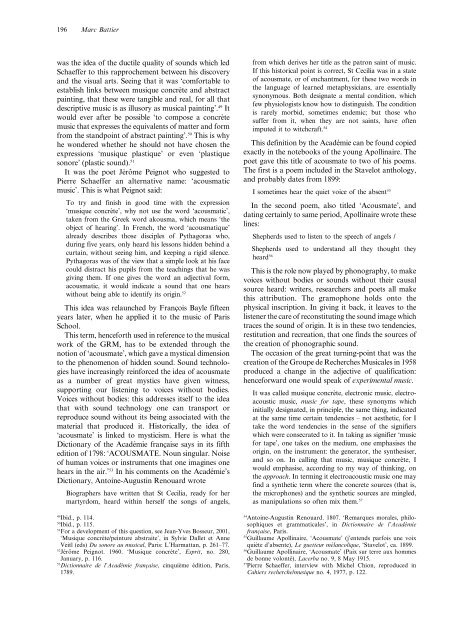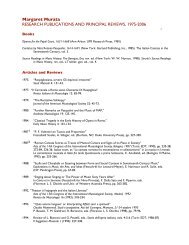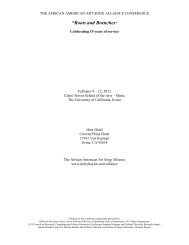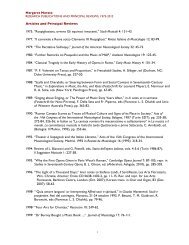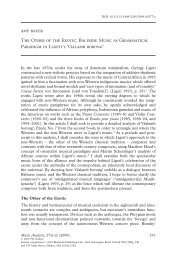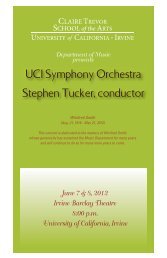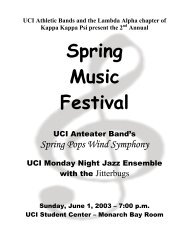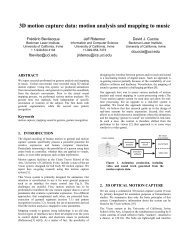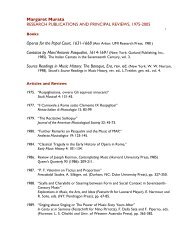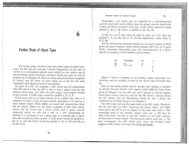What the GRM brought to music: from musique concre`te to ...
What the GRM brought to music: from musique concre`te to ...
What the GRM brought to music: from musique concre`te to ...
Create successful ePaper yourself
Turn your PDF publications into a flip-book with our unique Google optimized e-Paper software.
196 Marc Battierwas <strong>the</strong> idea of <strong>the</strong> ductile quality of sounds which ledSchaeffer <strong>to</strong> this rapprochement between his discoveryand <strong>the</strong> visual arts. Seeing that it was ‘comfortable <strong>to</strong>establish links between <strong>musique</strong> concrète and abstractpainting, that <strong>the</strong>se were tangible and real, for all thatdescriptive <strong>music</strong> is as illusory as <strong>music</strong>al painting’. 49 Itwould ever after be possible ‘<strong>to</strong> compose a concrète<strong>music</strong> that expresses <strong>the</strong> equivalents of matter and form<strong>from</strong> <strong>the</strong> standpoint of abstract painting’. 50 This is whyhe wondered whe<strong>the</strong>r he should not have chosen <strong>the</strong>expressions ‘<strong>musique</strong> plastique’ or even ‘plastiquesonore’ (plastic sound). 51It was <strong>the</strong> poet Jérôme Peignot who suggested <strong>to</strong>Pierre Schaeffer an alternative name: ‘acousmatic<strong>music</strong>’. This is what Peignot said:To try and finish in good time with <strong>the</strong> expression‘<strong>musique</strong> concrète’, why not use <strong>the</strong> word ‘acousmatic’,taken <strong>from</strong> <strong>the</strong> Greek word akousma, which means ‘<strong>the</strong>object of hearing’. In French, <strong>the</strong> word ‘acousmatique’already describes those disciples of Pythagoras who,during five years, only heard his lessons hidden behind acurtain, without seeing him, and keeping a rigid silence.Pythagoras was of <strong>the</strong> view that a simple look at his facecould distract his pupils <strong>from</strong> <strong>the</strong> teachings that he wasgiving <strong>the</strong>m. If one gives <strong>the</strong> word an adjectival form,acousmatic, it would indicate a sound that one hearswithout being able <strong>to</strong> identify its origin. 52This idea was relaunched by François Bayle fifteenyears later, when he applied it <strong>to</strong> <strong>the</strong> <strong>music</strong> of ParisSchool.This term, henceforth used in reference <strong>to</strong> <strong>the</strong> <strong>music</strong>alwork of <strong>the</strong> <strong>GRM</strong>, has <strong>to</strong> be extended through <strong>the</strong>notion of ‘acousmate’, which gave a mystical dimension<strong>to</strong> <strong>the</strong> phenomenon of hidden sound. Sound technologieshave increasingly reinforced <strong>the</strong> idea of acousmateas a number of great mystics have given witness,supporting our listening <strong>to</strong> voices without bodies.Voices without bodies: this addresses itself <strong>to</strong> <strong>the</strong> ideathat with sound technology one can transport orreproduce sound without its being associated with <strong>the</strong>material that produced it. His<strong>to</strong>rically, <strong>the</strong> idea of‘acousmate’ is linked <strong>to</strong> mysticism. Here is what <strong>the</strong>Dictionary of <strong>the</strong> Académie française says in its fif<strong>the</strong>dition of 1798: ‘ACOUSMATE. Noun singular. Noiseof human voices or instruments that one imagines onehears in <strong>the</strong> air.’ 53 In his comments on <strong>the</strong> Académie’sDictionary, An<strong>to</strong>ine-Augustin Renouard wroteBiographers have written that St Cecilia, ready for hermartyrdom, heard within herself <strong>the</strong> songs of angels,49Ibid., p. 114.50Ibid., p. 115.51For a development of this question, see Jean-Yves Bosseur, 2001,‘Musique concrète/peinture abstraite’, in Sylvie Dallet et AnneVeitl (eds) Du sonore au <strong>music</strong>al, Paris: L’Harmattan, p. 261–77.52Jérôme Peignot. 1960. ‘Musique concrète’, Esprit, no. 280,January, p. 116.53Dictionnaire de l’Académie française, cinquième édition, Paris,1789.<strong>from</strong> which derives her title as <strong>the</strong> patron saint of <strong>music</strong>.If this his<strong>to</strong>rical point is correct, St Cecilia was in a stateof acousmate, or of enchantment, for <strong>the</strong>se two words in<strong>the</strong> language of learned metaphysicians, are essentiallysynonymous. Both designate a mental condition, whichfew physiologists know how <strong>to</strong> distinguish. The conditionis rarely morbid, sometimes endemic; but those whosuffer <strong>from</strong> it, when <strong>the</strong>y are not saints, have oftenimputed it <strong>to</strong> witchcraft. 54This definition by <strong>the</strong> Académie can be found copiedexactly in <strong>the</strong> notebooks of <strong>the</strong> young Apollinaire. Thepoet gave this title of acousmate <strong>to</strong> two of his poems.The first is a poem included in <strong>the</strong> Stavelot anthology,and probably dates <strong>from</strong> 1899:I sometimes hear <strong>the</strong> quiet voice of <strong>the</strong> absent 55In <strong>the</strong> second poem, also titled ‘Acousmate’, anddating certainly <strong>to</strong> same period, Apollinaire wrote <strong>the</strong>selines:Shepherds used <strong>to</strong> listen <strong>to</strong> <strong>the</strong> speech of angels /Shepherds used <strong>to</strong> understand all <strong>the</strong>y thought <strong>the</strong>yheard 56This is <strong>the</strong> role now played by phonography, <strong>to</strong> makevoices without bodies or sounds without <strong>the</strong>ir causalsource heard: writers, researchers and poets all makethis attribution. The gramophone holds on<strong>to</strong> <strong>the</strong>physical inscription. In giving it back, it leaves <strong>to</strong> <strong>the</strong>listener <strong>the</strong> care of reconstituting <strong>the</strong> sound image whichtraces <strong>the</strong> sound of origin. It is in <strong>the</strong>se two tendencies,restitution and recreation, that one finds <strong>the</strong> sources of<strong>the</strong> creation of phonographic sound.The occasion of <strong>the</strong> great turning-point that was <strong>the</strong>creation of <strong>the</strong> Groupe de Recherches Musicales in 1958produced a change in <strong>the</strong> adjective of qualification:henceforward one would speak of experimental <strong>music</strong>.It was called <strong>musique</strong> concrète, electronic <strong>music</strong>, electroacoustic<strong>music</strong>, <strong>music</strong> for tape, <strong>the</strong>se synonyms whichinitially designated, in principle, <strong>the</strong> same thing, indicatedat <strong>the</strong> same time certain tendencies – not aes<strong>the</strong>tic, for Itake <strong>the</strong> word tendencies in <strong>the</strong> sense of <strong>the</strong> signifierswhich were consecrated <strong>to</strong> it. In taking as signifier ‘<strong>music</strong>for tape’, one takes on <strong>the</strong> medium, one emphasises <strong>the</strong>origin, on <strong>the</strong> instrument: <strong>the</strong> genera<strong>to</strong>r, <strong>the</strong> syn<strong>the</strong>siser,and so on. In calling that <strong>music</strong>, <strong>musique</strong> concrète, Iwould emphasise, according <strong>to</strong> my way of thinking, on<strong>the</strong> approach. In terming it electroacoustic <strong>music</strong> one mayfind a syn<strong>the</strong>tic term where <strong>the</strong> concrete sources (that is,<strong>the</strong> microphones) and <strong>the</strong> syn<strong>the</strong>tic sources are mingled,as manipulations so often mix <strong>the</strong>m. 5754An<strong>to</strong>ine-Augustin Renouard. 1807. ‘Remarques morales, philosophiqueset grammaticales’, in Dictionnaire de l’Académiefrançaise, Paris.55Guillaume Apollinaire, ‘Acousmate’ (j’entends parfois une voixquiète d’absente), Le guetteur mélancolique, ‘Stavelot’, ca. 1899.56Guillaume Apollinaire, ‘Acousmate’ (Paix sur terre aux hommesde bonne volonté), Lacerba no. 9, 8 May 1915.57Pierre Schaeffer, interview with Michel Chion, reproduced inCahiers recherche/<strong>musique</strong> no. 4, 1977, p. 122.


